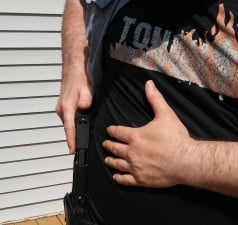

Fire safety is a big deal for every prepper. A house fire is one of the most devastating and also one of the most common disasters that is likely to befall you, and accordingly you must do everything that you can to keep that from happening.
Part of this is properly storing and managing potentially flammable substances and accelerates around your home.
Many things we keep in our homes could be the catalyst for a house fire! How about bleach? Is bleach flammable?
No, liquid bleach is not flammable and cannot ignite from exposure to open flame or to high temperatures. However, the oxidizers in bleach can make a fire burn hotter than usual, and heated bleach can release dangerous gasses which can be even more reactive.
Although bleach has many uses, you don’t have to worry about it being the cause of a house fire or going up in a huge fireball when an accidental fire gets out of control.
That being said, bleach can make any fire burn hotter due to its nature, and if it is exposed to intense heat or open flames, it can release dangerous gas that can hurt or kill you.
For this reason, you should never heat bleach and never use it to try and put out a fire! There’s a lot more you’ll want to know, and I’ll tell you about it below…
Does Bleach Ignite at Any Temperature?
No. Your bleach will not ignite at high temperatures. If a fire is very close or if the room or your bleach is stored is extremely hot, it still isn’t going to catch fire on its own.
Does Bleach React with High Temperatures?
Yes, yes it can. Bleaches, whatever kind they are, contain oxidizers, and oxidizers in sufficient concentrations can make fire burn even hotter as I mentioned above.
Although it’s unlikely to make a significant difference when you’re dealing with basic household bleach, concentrated bleaches and especially powdered bleach used for treating water supplies, swimming pools, and fountains can combust with little warning and greatly intensify a fire.
Worse yet, whenever bleach is heated it releases fumes that make it even more reactive with other chemicals and the more directly release chlorine gas which is dangerous enough on its own.
These fumes can easily harm or overwhelm you all on their own, and in an enclosed space or mixed with some other chemicals like ammonia they can incapacitate and kill rapidly.
You should never, ever heat bleach for any reason, and be aware of its additional hazardous properties if it’s exposed to intense heat or a fire!
Is Chlorine Bleach Flammable?
No, liquid chlorine bleach is not flammable. Powdered chlorine bleach products can pose a combustion hazard however, especially the highly concentrated ones.
Is Non-Chlorine Bleach Flammable?
No, non-chlorine bleach is not flammable but may still contribute to intensifying a fire due to the oxidizers it contains as with standard chlorine bleach.
Will Bleach Make a Fire Worse?
It can. It depends on the type of bleach, its form and its concentration whether or not it’s chlorine or non-chlorine.
Common household bleach is unlikely to intensify an accidental fire but it might. Highly concentrated bleach formulas definitely can, and any kind of powdered bleach can be a combustion hazard.
Is Bleach Reactive with Other Substances?
Yes, highly, and many interactions with other chemicals can make extremely hazardous substances or result in a severe fire hazard.
Bleach that is mixed with any kind of vinegar, ammonia or any other acidic or corrosive solution will typically react to form and extremely dangerous inhalation hazard, or produce volatile, combustive fumes which might be set off by a single spark or a surface that is hot enough.
Bleach is so reactive with ammonia that even relatively small amounts of it can combine with it and have severely hazardous results.
If you use a lot of bleach in a toilet and then urinate in it, the ammonia in your urine can be enough to produce chlorate gas which could knock you out. No joke!
This is why you must never, ever mix household cleaning agents for any purpose, and definitely never mix anything with bleach.
How Should You Deal with Bleach Exposed to Fire?
The best way to deal with a fire that is encroaching on a supply of bleach is to be aware that the fumes the bleach is releasing can hurt you, above and beyond what the smoke can do from the fire.
If you aren’t a professional firefighter with access to a self-contained breathing apparatus, you should keep your distance and call the cavalry. If you have no other choice, do your best to stay upwind of the fire so you get less exposure to the fumes.
If you must, you can put out the fire with water or common fire extinguishers… But do be prepared for a sudden intensification of the blaze owing to the oxidizers that are present in the bleach.
If a fire is encroaching on a quantity of any sort of powder bleach, consider it an extreme hazard and get as far away from it as you can. If it ignites, the blast could kill you or set you on fire.
Tom Marlowe practically grew up with a gun in his hand, and has held all kinds of jobs in the gun industry: range safety, sales, instruction and consulting, Tom has the experience to help civilian shooters figure out what will work best for them.


